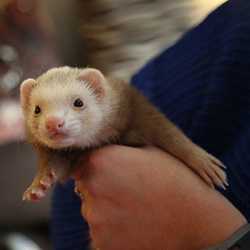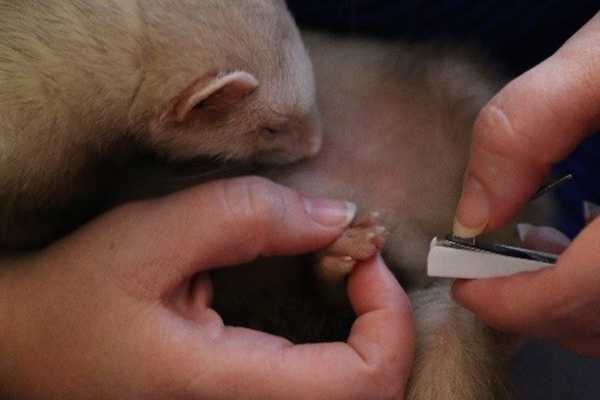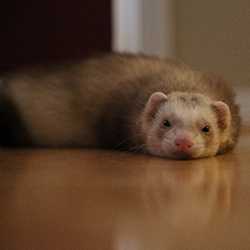Busy Ferrets Take Commitment


Becky cuddles her pet ferret Mani.
(Photos by Tim Daniels)
After a day of teaching history to high school students, Becky arrives home and is greeted by a swarm of lively ferrets. “They’re very sweet. They want to know where I’ve been,” she says fondly. She scoops up Mani, Bunji, and Sasha to pet them, before putting the long furry mammals back on the floor to run, climb, and play.
Her ferrets enjoy turning simple objects like old socks, paper grocery bags, and mailing tubes into fun toys. Becky also gives them regular toys, such as a dollhouse for ferrets, but is careful to avoid anything with small pieces that could be bitten off and swallowed.
A group of ferrets is called a “busyness” or “business,” referring to their characteristic of being so active. Hyper creatures with a fast metabolism, ferrets are smart and curious, so Becky provides a variety of stimulating playtime activities. She lets them chase balls, wrestle a stuffed animal, or grab the end of a toy and play tug of war. Like little detectives, the three champagne-colored ferrets scurry around with their long bodies, exploring every nook and cranny they can reach — which includes almost every place except the high kitchen stools and counters.
Ferrets require a high level of commitment to be cared for responsibly. In return, Becky says, they offer a steady supply of entertainment and affection. “They make me laugh. The love they have for me and each other makes my heart soft. Nobody loves you like your animals love you. They want my attention more than anything else in the world!”
Mani awakens first in the morning before the alarm goes off, wanting attention and a loving scratch. Soon Bunji and Sasha join the fun. Each morning and evening, they nibble on ferret food high in animal protein and fat content. Vegetables and fruit are out, because the delicate animals cannot digest them. “They don’t beg if I’m at the dining room table,” Becky reports. “They aren’t interested in human food.”
They also graze, nap, and play throughout the day, then go to bed when Becky does. All three are housetrained and use a litter box to go to the bathroom. While ferrets should not be confined to a cage at all times, the Humane Society of the United States recommends close supervision when allowing them out of their enclosures.
Taking care of ferrets

Ferrets’ toenails grow quickly and need to be cut regularly.
(Photo by Tim Daniels)
Becky grew up with dogs as family pets, but reasoned it wouldn’t be fair to have one as an adult because of her long hours away from home working as a public school teacher and Zumba instructor. She’s not a cat person, so ferrets seemed like the best option for companions. This trio is her second family of ferrets; she had one ferret who died of liver cancer at age three and left behind a lonely mate. Becky adopted two other ferrets to keep him company.
Like minks, otters, and skunks, ferrets are members of the weasel family and have an anal musk sac. Even though Becky’s ferrets underwent a surgical procedure to remove the anal sacs, they still retain some of their natural musky odor. Ferrets have a lifespan of approximately six- to nine years, and may live as long as twelve years.
They can be prone to certain diseases such as adrenal problems, so Becky keeps her trio up-to-date on vaccinations and regular veterinary visits, which include dental exams. Ferrets can carry and transmit rabies, so should be vaccinated against the fatal viral disease. They also are at risk of heartworm infection, which can be serious and even deadly, but is preventable. The American Heartworm Society recommends year-round prevention for ferrets.

Even busy ferrets need a rest every so often.
(Photo by Tim Daniels)
Veterinary visits are just part of the ferrets’ care. Becky bathes them with warm water and a gentle pet shampoo every four to six weeks, or in between if they need it. For socialization and mental stimulation, she also takes Mani, Bunji, and Sasha to high school when she talks about human and animal health in world history classes. Becky’s students enjoy accompanying her on field trips to a local ferret rescue shelter, where they tidy up the facility, play with the animals, and trim their toenails to prevent them from getting tangled in bedding or carpeting.
For Becky, because of their curiosity, intelligence, playfulness, and energy, ferrets are unmatched; however, these little pets require time and energy to be properly cared for. A sign on the front door of her home demonstrates her passion for them: “In case of emergency, please rescue the ferrets.”
She explains the strong attachment: “Having ferrets helps with my emotional well-being. With them, I have someone to look out for, love, and nurture. I never wanted kids; animals are really my thing.”
Ferrets 101
While ferrets can make good pets, they can also carry germs (such as bacteria, parasites, or viruses) that may make people sick. Such germs have been known to cause a variety of problems, from minor skin infections to serious disease. Always wash your hands (and your children’s) with running water and soap after contact with ferrets, their stool, and their food.
Children should never be left unsupervised with ferrets, according to The Humane Society of the United States. Ferrets have sharp teeth and occasionally bite when startled, excited, or handled improperly.
Some places, including California, Hawaii, New York City, and Washington, D.C., don’t allow ferrets as pets because they are considered wild animals. Check your state’s animal guidelines.
For More Information
- Page last reviewed: February 8, 2017
- Page last updated: February 8, 2017
- Content source:


 ShareCompartir
ShareCompartir